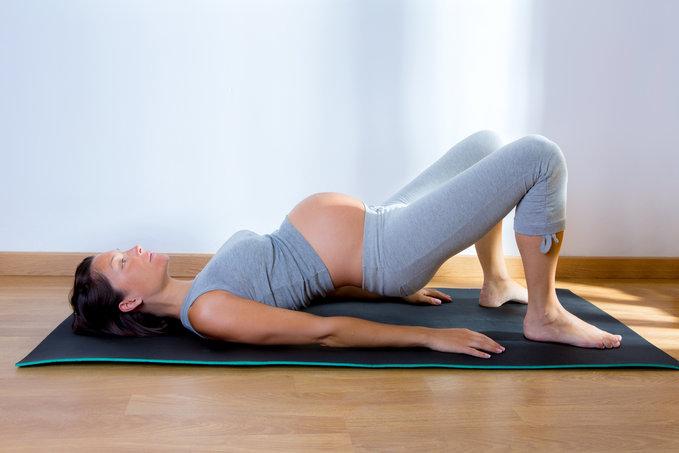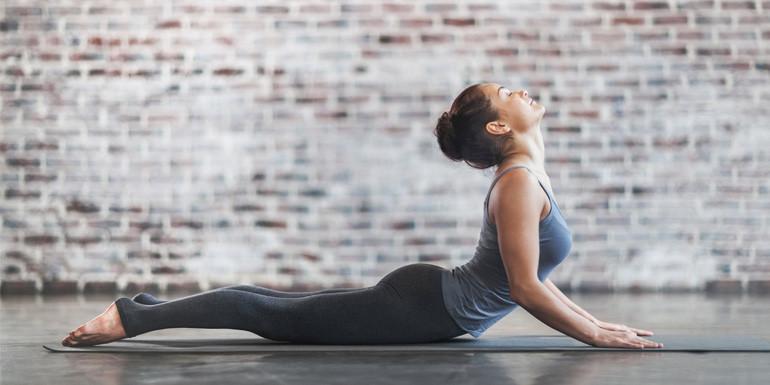Crucial Benefits of Exercise During Pregnancy
Crucial Benefits of Exercise During Pregnancy
 With all the other things you need to deal with, exercise could be the last thing on your mind right now as a would-be mom. However, exercise during pregnancy is as important as a highly nutritious diet for you, your baby, and childbirth. Think of it as an investment which will give you invaluable returns in terms of your overall health for the long run – making sure that you are enabled to deliver your baby with less complications. In fact, all those weird feelings and seemingly unexplained fatigue you are experiencing can be alleviated by any form of exercise when endorphins get released. So it doesn’t matter that much as to which kind you choose as long as you get moving until you finally give birth.
With all the other things you need to deal with, exercise could be the last thing on your mind right now as a would-be mom. However, exercise during pregnancy is as important as a highly nutritious diet for you, your baby, and childbirth. Think of it as an investment which will give you invaluable returns in terms of your overall health for the long run – making sure that you are enabled to deliver your baby with less complications. In fact, all those weird feelings and seemingly unexplained fatigue you are experiencing can be alleviated by any form of exercise when endorphins get released. So it doesn’t matter that much as to which kind you choose as long as you get moving until you finally give birth.
Get all the workouts you need plus Pre and Post Natal workouts with Beachbody On Demand.
Real Deal Benefits
Staying physically active is undoubtedly an effective way of keeping yourself happy and healthy. However, some women can have doubts and fears about exercising during pregnancy as it may cause harm to their unborn child. Fortunately for you, that is not the case. Keeping yourself moving through a regular exercise routine has been proven to help with weight maintenance and with the prevention of diseases such as gestational diabetes.
The advantages of pregnancy exercising include:
Relief from back and pelvic discomfort
As your baby bump grows, extra weight and pressure are likewise exerted, particularly targeting the lower half of your body. This causes the aches on your back and pelvis that can really bother you and even agitate the way you walk. With proper stretching and exercising, you can minimize back or pelvic pains especially during the late period of your pregnancy when you are at your heaviest.
Significant mood improvement
Exercise is not only known to help you physically, but mentally and emotionally as well, as your brain secretes chemicals called endorphins that activate a positive and energized feeling in your body. You see, with hormones raging, pregnant women tend to be so much more hypersensitive to depression and anxiety. Such a condition is not only harmful to you but can also cause negative effects on your baby’s overall growth and development in your tummy. Staying active will help reduce depression while boosting your mood and decreasing any feelings of anxiety and stress.
Well-managed blood pressure levels
A pregnant woman’s blood pressure can increase occasionally, but preeclampsia can likewise occur if it gets too high. Preeclampsia is a condition characterized by high blood pressure in pregnant women who have not had it before. If not properly diagnosed, it can develop into eclampsia which is an even more serious condition that puts you and your baby in danger and can result to death in rare cases. One study highly suggests that any form of exercise or movement, such as simply going for a walk on a regular basis, will help prevent blood pressure from rising.
Constipation prevention
Active bowels are indicative of a healthy, well-functioning body system. In pregnancy however, an increase in hormones called progesterone can cause constipation as the smooth muscles are relaxed throughout the body, digestive tract included. Constipation can result as food pass through your intestines more slowly. It is advisable then for pregnant women to do at least 10 to 30 minutes of brisk walking to get them going and regular.
Sleep recovery
Many pregnant women reportedly find it difficult to fall asleep especially at that time when their bellies start to grow bigger and they struggle with their sleeping positions. In addition, the pressure on their urinary bladder can really wake them up in the middle of night, sometimes many times during the night, forcing them to get up and go to the washroom for relief. On the other hand, those who are constantly active attest that their sleep has better quality and they feel more refreshed upon waking up as long as their physical activity is not nearing bedtime and is able to boost their energy during the day.
Reduced risk of complications in pregnancy
A 2012 study has found that women who frequently took part in fitness programs have a slimmer chance of developing type 2 diabetes. It doesn’t have to be something that you engage in rigorously right away. You can simply stay active for 30 minutes daily or at least 5 days in a week. Walking is a natural way by which you can achieve this and is highly recommended during pregnancy. Compared to those who remained sedentary, active women lowered their risk of having unplanned cesarean sections.
Diminished fatigue
Fatigue usually plagues most women, especially on the earlier and later stages of pregnancy which is the first and the third trimester. On the contrary, choosing inactivity over regular exercise and taking more than enough rest can sometimes tire you out more, making you feel weak or groggy. You can, however, try taking easy walks or prenatal yoga classes to up your energy level without pushing yourself too far off your exhaustion limit.
Reduced risks of complications during delivery
A study conducted in Spain has revealed that women who exercised at least thrice a week had lesser weight gain during pregnancy with lowered odds of carrying babies that weighed over nine pounds, also called macrosomic babies, upon their birth. This is really good news since delivering heavier babies can result to problems for both you and your child. Thus, exercise does not only help you with your own weight management but also eases the way for your equally fit baby during delivery.
Quickened recovery after delivery
Since exercise is proven to improve the stamina that you need badly during labor and childbirth, your physical recovery after delivery will also tend to be faster when you have prepared your body sufficiently through exercise. The same study in 2012 reached the conclusion that women who exercised recuperated faster after childbirth and returned to perform their household work or get to their jobs quicker than those who were physically inactive. The effects of regular exercise are both immediate and long-term.
Ultimately, there are exceptions to consider like specific medical conditions that might put both the mother and child at risk. In addition, exercising doesn’t necessarily mean that you’ll have zero complications during delivery nor does it guarantee the complete absence of backaches. However, being active is generally recommended in order to have a healthy and comfortable pregnancy up until you finally give birth.
For your babe
While you enjoy dancing, swimming, or brisk walking for yourself, the benefits also get happily extended to your baby. Researches are still being conducted, but little by little, human studies are starting to confirm animal studies on the benefits of exercise on both mommies and babies. Recent studies show that the benefits of pregnancy workout routines tend to last for years as seen in rats and mice, and that the same promising results can be foreseen in human subjects.
The potential gains on your baby’s well-being can include the following:
Optimal brain health
In yet another mice study, would-be moms were given exercise wheels and when they gave birth, their offspring showed less tendencies for neurodegeneration or those brain changes that can ultimately result in Alzheimer’s disease.
Happier heart
A group of researchers on human babies were able to discover that those whose moms exercised regularly while pregnant had lower heart rate at 36 weeks gestation indicating that the fetuses did not suffer any fetal distress. It was in 2014 that a follow up study of the same babies was conducted until they were a month old, and it was seen that their mom’s pregnancy exercise still had its beneficial effects on their heart rates even after birth.
Low Body Mass Index
In more studies on mice pregnancy, the researchers have discovered that exercising pregnant moms had babies that were least prone to obesity. Even if their moms consumed a high-fat diet, the same favorable effect was observed, wiping out the negative consequences of their unhealthy consumption with regular exercise.
Diabetes prevention
In a study of exercising rat moms, it was found that their babies were more sensitive to insulin compared to those who were not. The odds of diabetes had been significantly reduced up until the baby rats grew into adults themselves.
Pre-exercise essentials
Before you get on that yoga mat or put on your swimsuit, it is important to follow these ground rules first. Yes, you need to exercise if you want the benefits, but for the sake of safety, here are the pre-exercise essentials that you need to take note of first:
1. Pay your doctor a visit
In anything and everything that you do, always ask for your doctor’s approval to confirm that you are indeed on the right track. Your OB-GYN’s experience and expertise about your particular case will zero in on the specifics of what is safe and not safe for you. Do not do anything just because most pregnant women you know or have read about do it themselves because not all pregnancies are the same. Should you have a medical complication or an at-risk pregnancy, your doctor can impose limitations on your exercise program or completely restrict you from doing any. On the other hand, if you have been diagnosed with gestational diabetes, you will be highly encouraged to stay physically active.
In both cases, ensure that you and your practitioner are on the same page when it comes to your fitness level and exercise intensity, clearly defining what you consider easy or moderate. If you have been active before you got pregnant, it is most likely that your doctor will recommend that you continue with your regular routine with minimal modifications but without any of those pregnancy-taboo, high-contact, or altitude sports. If you are not used to any exercise at all, ask your OB-GYN which ones you can try.
2. Let your morphing body take the lead
Your body is not the same when you become pregnant and just by your shape, you too can tell the difference. As such, it should follow that your exercises change together with your body. When you notice your sense of balance shifting or when you’re feeling the need to slow down, then modify your workout routines to avoid harm, injury, or any untoward accidents. Even the way you execute specific routines that you have been doing for years will seem different as your motherly instincts prompt you to decrease any strain on your growing belly. If you are fond of brisk walking, you’ll notice yourself slowing down or getting easily tired as you feel the pressure on your knees and hips while your pregnancy progresses each week.
And just because you seem to be gaining weight doesn’t imply you will feel stronger as well because your ligaments and joints are loosening too, making you feel and act differently. Also remember to keep your blood flow going by avoiding yoga and tai chi poses, exercises, or movements that may restrict the same such as continuous standing or lying on your back without any movement.
3.Take it slow
There is no rush when it comes to exercising during pregnancy. What counts more is the consistency of having sufficient physical activity daily. So its best to just take it slow and then focus on making a much-desired lifestyle out of exercise especially when you are new at it. If you already are a fitness buff, it is more advisable to maintain your current pace and level of intensity as when you were not yet pregnant. You can simply pick it up and increase it a notch when you want to after you give birth.
In terms of exercise duration, thirty minutes per day is an ideal goal to keep in mind. You don’t have to push yourself too hard, too soon but gradually work your way up until your reach your thirty-minute goal depending on how your morphed body is taking it. What will be good for your heart and overall health though is three 10-minute walks spread out during the day as this is as good as a 30-minute treadmill. Your daily chores also count even if they are non-exercise physical activities, so some light gardening or vacuuming at 15 minutes each is desirable. You can also choose to workout for an hour at the most when you feel your body can still handle it. Pregnant women are more prone to fatigue and then injury when they are not careful. Try not to exert too much effort as overexertion can lead to dehydration and shortness of breath, depriving your baby of much-needed oxygen.
4. Have fun!
The motivational key to a regular and consistent pregnancy exercise is the fun factor. So choose one that you will enjoy and always look forward to doing especially no- to low-impact exercises like swimming and walking. Other recreational activities such as dancing and aerobics are also considered safe for baby and enjoyable for mommy especially during those low energy, lazy days. If you are the social type and feel energized around people, you can attend prenatal yoga classes or have a walking buddy you can have juicy conversations with. This way, it won’t feel like you are exercising but simply socializing.
5. Get ready and gear up
Mental and physical preparations are a must in the world of maternal exercise programs so you have to exercise smart for your developing baby. Use your motherly intellect to judge your actions before embarking in a new endeavor. To sustain your energy, you can have some light snacks an hour before your workout. Also gup down one glass of water or fresh fruit juice and stay hydrated all throughout your physical activities. At the end, refuel yourself with some more healthy drinks. Do not go out if its too hot outside as this can also cause dehydration. Dress comfortably in warm and loose clothing and have a supportive sports bra under to accommodate your enlarging mommy breasts. Your shoes should likewise correspond with the exercise you are doing for maximum support.
No-no exercises during pregnancy
Most workouts are considered generally safe and effective for expectant mothers but there are exceptions to the rule. These are exercises to avoid at all cost if you do not want any risks or complications during these delicate times.
High-risk sports
Some sports become more appealing as the risks involved increase. However, pregnancy is not the best time for risking abdominal injuries or falling. Avoid ice-skating, gymnastics, horseback riding, intense racquet sports, downhill skiing or snowboarding, bungee jumping, soccer, and all other contact sports. Even light exercises that require you to lie on your back are not recommended after you reach your third trimester of pregnancy as the pressure on your blood vessels can cause restrictions in yours and your baby’s circulation. You will know when this happens because you will feel dizzy or experience shortness of breath.
Those considered as high altitude sports and activities like mountaineering or hot air ballooning, no matter how adventurous, are not to be experimented on while you are on the way. If a certain activity would require you to go higher than 6,000 feet, then avoid it for your own good.
Rough exercises and movements
Some exercises or seemingly small movements can actually be rough on your pregnancy and should be avoided. As your abdomen grows, your sense of balance will also be challenged and you do not want to contract any injuries to your abs. Advanced abdominal movements can cause for the abs muscles to get separated from the midline or worse, get torn. So if you really are into strengthening your core, go for ab moves that are pregnancy-safe, but a big no-no to double leg lifts or full sit ups. Should racket sports be your thing, go for playing doubles to lessen the impact instead of playing singles.
Exercises that involve balance is strictly off-limits in this case. In fact, hanging on to a chair or keeping by the wall while roaming around the house or office is a good back up plan in case you feel dizzy all of a sudden or lose your sense of balance. Keep jumping or jerking movements to a minimum as you gain more weight. Slow dancing or aerobics are fine if you are used to them and you do not go too fast. To avoid cramping your calves, do not point your toes and instead flex your feet to drive the top of your foot towards your calves.
Extreme moves
Critically intense movements tend to heighten the risk of getting injured and this is the primary reason why they need to be avoided. Your ligaments loosen up during pregnancy and is therefore not the best time for back bends, excessive stretching, contortions, deep knee bends, or those in which deep flexion is involved. So forget about bouncy stretching, trying a split, extending your joints, or giving advanced yoga positions a shot at this time.
Specific to yoga, some movements that require you to stand motionless for some time can actually restrict the flow of blood and this include extended hands to big toe or the tree pose. Hot or bikram yoga cannot also be enjoyed during pregnancy as the humid conditions raises your body’s temperature too strongly resulting in blood shunting away from your uterus and towards your skin as it attempts to cool off. In the same manner, the flow of oxygen cannot be interrupted for you and your baby so any activity that can cut off this constant flow is not allowed – think scuba diving or simply holding your breath for some reason. Plan your next dive when you aren’t carrying a passenger in your tummy any longer as you do not want to risk decompression sickness in your baby.
Pregnancy Exercise Tips
1. Listen to your body. You can learn all about playing safe while exercising but you are still the best judge when it comes to doing the right thing, as your body will tell you when you are getting too far. So listen to your body, go at your own pace, and stop or pause whenever you need to.
2. Never overexert. Definitely, exercise is recommended during pregnancy but only to a certain extent. Shortness of breath and dehydration are consequences you want to avoid by overexerting yourself.
3. Exercise to energize. Remember that the purpose of exercise, even in pregnancy, is to give you energy and continually renew your strength. If a particular workout leaves you exhausted to the point of fatigue, then you might not be doing it right. Take a rest, slow down, and exercise more appropriately.
4. Calorie up. Preggy or not, working out burns calories and this means eating nourishing foods and preparing your body. If your current BMI is at a healthy range of 18.5 to 24.9, then you will need an additional 340 calories per day in your second trimester and around 450 calories on your third trimester. Should you be underweight or overweight, you will have to make the necessary adjustments to your calorie intake with your doctor’s guidance.
5. Have just enough. If you are the competitive type or is used to pushing yourself hard, pregnancy requires you to take more caution than usual. Muscle soreness the next day after workout can be expected but watch out for acute joint and muscle pain as they could indicate an overuse injury. And so, exercise enough but never too much.
6. Start right. Another way to avoid injury is to start right by warming up before you dive into any physical activity. In this way, you will be able to prepare your joints and muscle as well as increase your heart rate in a gradual manner. A good old warm up reduces the aches and pains after a workout.
7. Watch out for irritability. The release of endorphins during exercise is intended to boost your mood. However, if you are feeling even more hot-tempered than usual, then watch out because this is a sign telling you to taper back.
8. Hydrate and drink up. The best time to hydrate is before, during, and after you work out. There’s no specific amount as to how much you should be drinking but, experts advise you gauge your hydration level using the color of your urine. When it’s pale yellow or almost clear, then you are good to go. When its dark yellow, you could be dehydrated and you need to gulp down a glass or two every hour till it’s nearly clear.
9. Develop a habit. Consistency is key to reaping the full benefits of exercise during pregnancy and unless you make a habit out of it, it’s not gonna make a significant impact. So make it a commitment to yourself and your baby until the routine eases up on your body. As long as your healthcare provider gives you the green light, 20-30 minutes of exercise for all or most days of the week is recommended by the American College of Obstetricians and Gynecologists.
10. Sleep like a baby. It won’t be the same once baby is out, so while you are still pregnant, take advantage of it and enjoy a full 8 hours of simply dozing off. This will allow your body to rest and rejuvenate for the next day’s workout grind. Besides, your physical activities during the day will tire you just right and you will easily have a shut-eye once you hit the sack.
Exceptions to Pregnancy Exercise
Each pregnancy experience is as unique as every individual. As such, not all pregnancies are the same and not all pregnant women can go through a workout routine safely. In fact, there are complications that when coupled with exercise, prove to be more dangerous than helpful. Cases such us an incompetent pregnancy, persistent vaginal bleeding, pregnancy-induced hypertension, or intrauterine growth restriction aren’t usually exercise-friendly and need absolute approval from your healthcare provider.
Even when you do not have any of these complications but experience some warning signs, you are advised to stop any physical routine immediately and notify your practitioner. The symptoms include vaginal bleeding, contractions, faintness, shortness of breath, dizziness and sharp pain.
Typically, your baby inside the womb will just relax while you do your workout. A healthy snack afterwards can help you feel revitalized as well. Also after your workout, in about two hours, it is expected that fetal movement will return to normal. In case it does not, it is best to call your doctor immediately.
Whether a complication exists or not, steering pregnancy exercise to your advantage would mean listening closely to what your body tells you. A good guide to follow is the Rate of Perceived Exertion where you imagine a scale of 6 to 20 in terms of the effort that you exert. When you are at rest, a scale of 6 is rated, while 20 is when your exercise is at its maximum. An exertion rate that is between 12-14 is considered ideal for exercise during pregnancy such as in brisk walking. To demonstrate it more clearly, your workout should let you exert effort and feel your breath go more heavily. But if it comes to a point where it’s almost impossible to breath and that its hard to talk or whistle, then that is certainly the point of overdoing it.
Get all the workouts you need plus Pre and Post Natal workouts with Beachbody On Demand.






